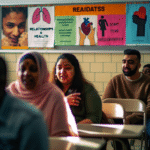This article delves into the crucial elements of sexual health and relationship education. By focusing on respectful relationships, informed decision-making, and body awareness, individuals can establish a foundation for healthy interactions. The integration of practical tools and emotional care resources helps form a bridge to holistic personal well-being.
The Role of Sexual Health Education
Comprehensive sexual health education serves as a cornerstone for equipping individuals with essential knowledge concerning anatomy, safe practices, and emotional responsibilities in intimate relationships. By fostering an environment of informed decision-making, individuals can navigate complexities surrounding intimacy with confidence. Such education emphasizes understanding one’s own body and the importance of personal health care, which plays a vital role in reducing health risks. Additionally, it nurtures skills like communication and trust, paving the way for healthier and more fulfilling relationships.
Building Respectful Relationships
Empowering initiatives like Our Watch highlight the importance of preventing violence and fostering respectful relationships through targeted education. By promoting behavioral change, these programs focus on building awareness around healthy connections, emphasizing trust and communication. Through community support, individuals learn about setting and respecting boundaries, which is crucial for personal safety and emotional wellness. Workshops and resources encourage understanding of safe touch and care, creating environments where intimacy is based on respect and informed decision-making, nurturing a culture of mutual understanding.
Leveraging Healthy Relationship Tools
Healthy relationship education programs equip individuals with essential tools to foster positive connections. By focusing on communication skills, active listening, and empathy, these programs enable participants to express feelings openly and resolve conflicts respectfully. Techniques such as role-playing and scenario analysis enhance understanding of healthy boundaries and emotional care. Participants learn to identify safe practices in intimacy, emphasize trust and clarity, and cultivate wellness-based lifestyles. This foundation empowers individuals to engage in relationships that prioritize mutual respect and informed decision-making.
Empowering Informed Decision-Making
Data-informed and evidence-based strategies in relationship education empower individuals to make choices that are safe, respectful, and aligned with their personal values. By utilizing robust research, these strategies ensure that participants are equipped with accurate information about emotional wellness, healthy boundaries, and effective communication. This approach promotes informed decision-making regarding intimacy and relationships, fostering an environment where trust is key. Ultimately, the right guidance enables individuals to navigate their personal and interpersonal dynamics with clarity and confidence, reinforcing the principles outlined in the previous chapter.
Promoting Body Awareness and Personal Care
Body awareness education plays a vital role in fostering personal health care and self-awareness, serving as a cornerstone for understanding boundaries. By engaging individuals with their own bodies, it enhances their ability to recognize personal limits and communicate them effectively. This understanding is essential for maintaining autonomy and respecting others. As individuals cultivate awareness of their physical selves, they become more equipped to navigate relationships with confidence, ensuring that interactions remain healthy, consensual, and grounded in mutual respect.
Looking Back
A comprehensive approach to sexual health and relationship education fosters respect and understanding. By equipping individuals with knowledge and tools for informed decision-making, we pave the way for a society where respect, safety, and well-being are central to personal interactions.






Leave a Reply